Newspapers
Hi there. Welcome to this special section @ Wordpandit.
Our endeavour here is very simple: to highlight important daily vocabulary words, which you would come across in leading newspapers in the country. We have included the following newspapers in our selection:
• The New York Times
• The Washington Post
• Scientific American
• BBC
• The Guardian
• Psychology Today
• Wall Street Journal
• The Economist
We are putting in extensive work for developing your vocabulary. All you have got to do is be regular with this section and check out this post on a daily basis. This is your repository of words that are commonly used and essentially, we are posting a list of daily used words. Hence, this has significant practical application as it teaches you words that are used commonly in leading publications mentioned above.
Visit the website daily to learn words from leading international newspapers.
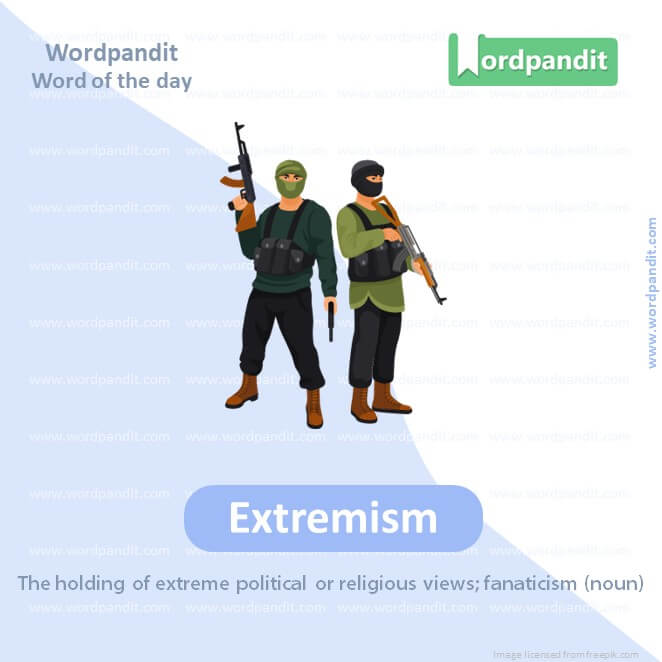
WORD-1: Extremism
CONTEXT: That kind of extremism is easy to define. Many people harbour crackpot notions, but thinking extreme thoughts is not illegal.
SOURCE: Guardian
EXPLANATORY PARAGRAPH: Imagine if someone liked chocolate ice cream so much that they said only chocolate ice cream should exist, and all other flavors must go away. That’s a bit like “extremism.” It’s when people have very, very strong opinions about something and think everyone should agree with them, even if it means not listening to anyone else’s ideas.
MEANING: The holding of extreme political or religious views; fanaticism (noun)
PRONUNCIATION: ik-STREE-miz-uhm
SYNONYMS: radicalism, fanaticism, zealotry, militancy, dogmatism
USAGE EXAMPLES:
1. The book discussed the dangers of extremism in politics.
2. Extremism can lead to conflicts and is often harmful to society.
3. His views were considered extremism by many in the community.
4. The government launched a program to combat extremism.
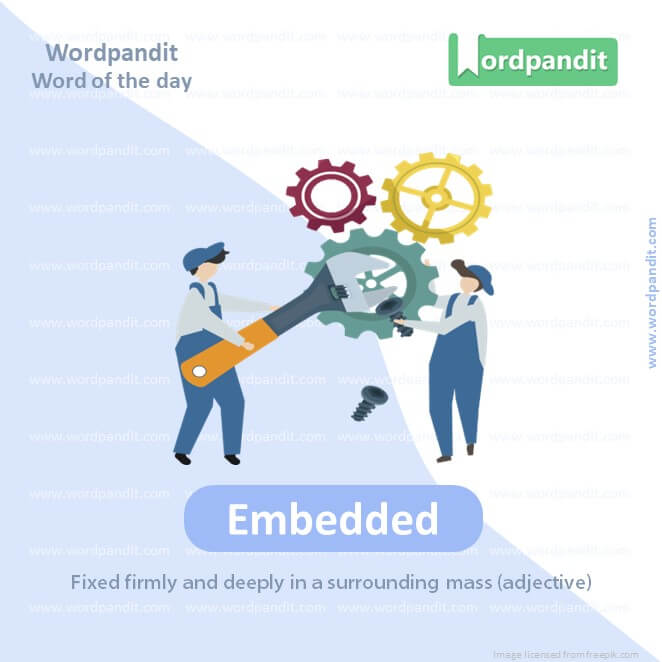
WORD-2: Embedded
CONTEXT: The hard part is policing ideas that tend away from democracy; identifying movements that have hatred so embedded in their core that no public manifestation can come to any good.
SOURCE: Guardian
EXPLANATORY PARAGRAPH: Imagine if you buried a treasure deep in the sand where it’s stuck and hard to see. When something is “embedded,” it’s like that treasure, placed deeply inside something else so it becomes a part of it.
MEANING: Fixed firmly and deeply in a surrounding mass (adjective)
PRONUNCIATION: em-BED-id
SYNONYMS: implanted, entrenched, inserted, ingrained, fixed
USAGE EXAMPLES:
1. The journalist was embedded with the troops to report on the war.
2. The splinter was embedded in his finger, making it hard to remove.
3. Her teachings are deeply embedded in my memory.
4. The video was embedded in the web page.
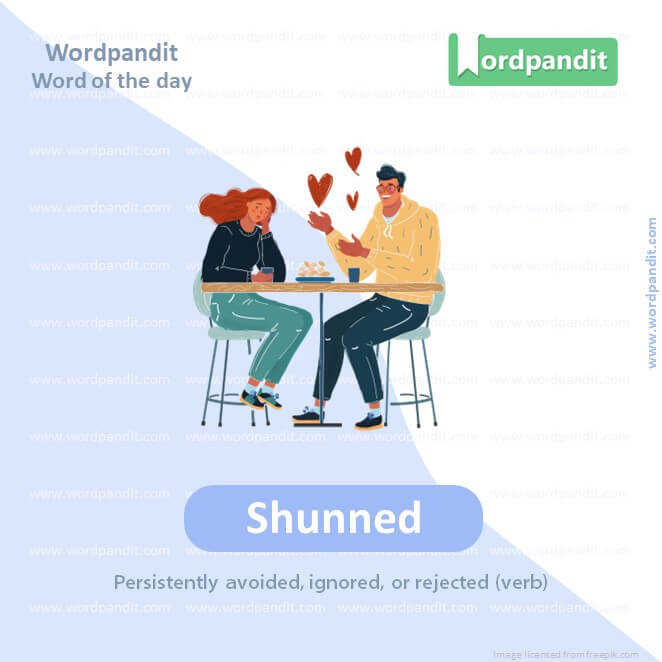
WORD-3: Shunned
CONTEXT: Organisations that find themselves on the wrong side of the line will not be banned but they might be officially shunned and denied funding.
SOURCE: Guardian
EXPLANATORY PARAGRAPH: If there’s someone at school who you don’t want to play with, so you always stay away from them and don’t talk to them, you are “shunning” them. It’s like making a bubble around yourself so you don’t have to be near someone you don’t like or agree with.
MEANING: Persistently avoided, ignored, or rejected (verb).
PRONUNCIATION: SHUHND
SYNONYMS: avoided, ostracized, ignored, spurned, excluded
USAGE EXAMPLES:
1. He was shunned by his community for his beliefs.
2. The old superstitions are now shunned by most people.
3. She shunned the company of others after the rumor spread.
4. Celebrities often feel shunned by real friends.
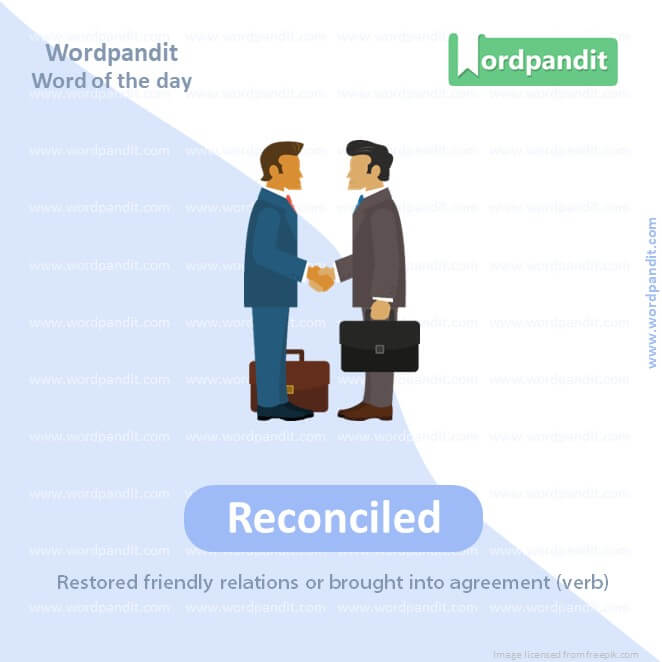
WORD-4: Reconciled
CONTEXT: Ostracising maniacs is not a bad idea. But naming beliefs that can’t be reconciled with democracy is tricky when lots of opinions have a moderate version and a fanatical extrapolation that can justify atrocity.
SOURCE: Guardian
EXPLANATORY PARAGRAPH: Imagine you and your best friend had a big fight over who gets to play with a toy, but later, you both decide to say sorry and play together again. When you make up and are friends again, that’s being “reconciled.” It’s when people stop being mad at each other and become friendly again.
MEANING: Restored friendly relations or brought into agreement (verb)
PRONUNCIATION: REK-un-syled
SYNONYMS: made up, resolved, settled, mended, harmonized
USAGE EXAMPLES:
1. They were finally reconciled after months of disagreement.
2. He reconciled with his brother after years of not speaking.
3. The couple reconciled and decided to give their relationship another chance.
4. She worked hard to reconcile her conflicting feelings.
WORD-5: Saboteurs
CONTEXT: Remainers were still being called traitors, quislings and saboteurs in parliament and the press for years after Cox’s death.
SOURCE: Guardian
EXPLANATORY PARAGRAPH: Think about when you’re building a tower with blocks and someone sneaks up and knocks it down on purpose. That person is being a “saboteur.” It’s a word for someone who messes things up on purpose, especially to stop something from working the way it should.
MEANING: Persons who destroy or damage something deliberately (noun).
PRONUNCIATION: sab-oh-TERZ
SYNONYMS: vandals, wreckers, disruptors, underminers, traitors
USAGE EXAMPLES:
1. The factory machinery was damaged by saboteurs.
2. They searched for the saboteurs who had infiltrated the organization.
3. Acts of sabotage were carried out by skilled saboteurs.
4. The group was accused of being saboteurs against the project.
WORD-6: Denounce
CONTEXT: MPs who do not explicitly denounce government action are accused of moral complicity in the deaths of Muslims in the Middle East.
SOURCE: Guardian
EXPLANATORY PARAGRAPH: If you see someone being mean and you tell a teacher so they can help stop it, you are “denouncing” the mean behavior. It’s when you speak up to say that something or someone is wrong or bad, trying to make sure others know it’s not okay.
MEANING: Publicly declare to be wrong or evil (verb).
PRONUNCIATION: di-NOUNS
SYNONYMS: condemn, criticize, attack, censure, rebuke
USAGE EXAMPLES:
1. The mayor denounced the act of vandalism in the city.
2. Activists denounce the new law as unjust.
3. He was quick to denounce his former colleague to clear his own name.
4. The practice was denounced as immoral by the community leader.
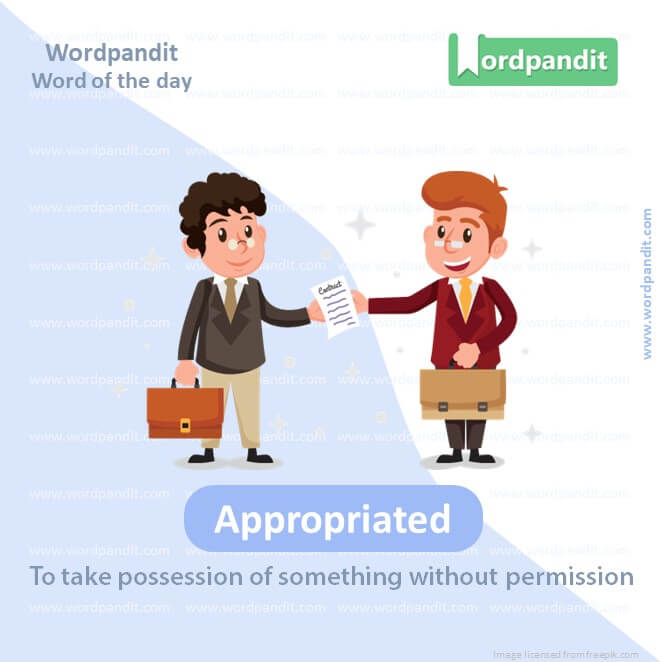
WORD-7: Appropriated
CONTEXT: Harbi Ali and Mair cannot be used to discredit the causes they appropriated.
SOURCE: Guardian
EXPLANATORY PARAGRAPH: Imagine if you took your friend’s crayon without asking because you wanted to use it for your drawing. That’s a bit like “appropriating.” It means taking something for your own use, usually without permission.
MEANING: To take possession of something without permission
PRONUNCIATION: uh-PROH-pree-ay-ted
SYNONYMS: seized, annexed, commandeered, expropriated, usurped
USAGE EXAMPLES:
1. The government appropriated land for the new highway.
2. Funds were appropriated for the education project.
3. The artist appropriated images from popular culture in his artwork.
4. She was accused of appropriating company funds.
WORD-8: Alienation
CONTEXT: A likely effect is expanding the pools of alienation where actual extremists fish for recruits.
SOURCE: Guardian
EXPLANATORY PARAGRAPH: Imagine feeling like you’re from another planet because no one seems to understand you or wants to play with you. That feeling of being left out or different is called “alienation.” It’s when you feel alone and not part of any group or friendship.
MEANING: The state of feeling isolated or estranged (noun).
PRONUNCIATION: ay-lee-uh-NAY-shun
SYNONYMS: isolation, estrangement, detachment, distance, disaffection
USAGE EXAMPLES:
1. He experienced a deep sense of alienation from society.
2. The new policy created feelings of alienation among employees.
3. Alienation can result from a lack of understanding or acceptance.
4. The character in the novel struggles with alienation and loneliness.
WORD-9: Segregation
CONTEXT: With the right combination of social dislocation, communal segregation and a plausible foe, pretty much any set of beliefs can be refined into a fundamentalist cult of redemption through violence.
SOURCE: Guardian
EXPLANATORY PARAGRAPH: Imagine if all the kids with blue shirts were told to play on one side of the playground and kids with red shirts were told to play on the other side, and they weren’t allowed to mix. That’s “segregation.” It’s when people are separated into groups based on something about them, like their shirt color, and kept apart.
MEANING: The action or state of setting someone or something apart from others (noun).
PRONUNCIATION: seg-ri-GAY-shun
SYNONYMS: separation, division, partition, isolation, exclusion
USAGE EXAMPLES:
1. Segregation was once a law that kept black and white people apart.
2. The segregation of waste helps in recycling processes.
3. There was a call to end segregation in schools.
4. Segregation in any form is harmful to society.
WORD-10: Contagious
CONTEXT: Democracy allows the virus of anti-democracy to incubate and trusts that it won’t be contagious.
SOURCE: Guardian
EXPLANATORY PARAGRAPH: Think about when one person has a cold and sneezes near someone else, and then that person gets a cold too. That’s because colds are “contagious.” It means something like a cold can be easily passed from one person to another just by being close to them.
MEANING: (Of a disease) spread from one person or organism to another, typically by direct contact (adjective).
PRONUNCIATION: kuhn-TAY-juhs
SYNONYMS: infectious, transmissible, communicable, spreadable, transferable
USAGE EXAMPLES:
1. Chickenpox is highly contagious.
2. Her laughter was so contagious, everyone started laughing too.
3. They were warned to stay away from contagious diseases.
4. The flu is more contagious in the winter months.
Vocabulary Words with Meaning, Synonyms and Antonyms PDF
The voyage to language mastery often involves decoding the ‘vocabulary words with meaning, synonyms and antonyms PDF’. This valuable resource is a treasure chest of words, offering definitions, similar phrases, and contrasting expressions all in one place. Yet, recognizing the full potential of ‘vocabulary words with meaning, synonyms, and antonyms PDF’ entails more than just glossing over the words, it demands active and strategic engagement.
To uncover the richness of ‘vocabulary words with meaning, synonyms and antonyms PDF’, focus on understanding the context of each word, along with its synonyms and antonyms. Group words under themes to create word maps, linking synonyms and contrasting antonyms, for a better grasp of the material.
When delving into a ‘vocabulary words with meaning, synonyms and antonyms PDF’, use annotation tools for an interactive study experience. Make personal notes about each word and how you connect with it. This personalized touch aids in memorization and enhances recall.
To cement the learning from ‘vocabulary words with meaning, synonyms and antonyms PDF’, regular revision is pivotal. Spaced repetition, a learning technique where intervals between each review are gradually increased, can significantly enhance long-term memory retention.
The most crucial aspect, however, is practical application. The ‘vocabulary words with meaning, synonyms and antonyms PDF’ should act as a springboard for real-world application. Incorporating learnt words, along with their synonyms and antonyms, in conversations or digital interactions, reinforces understanding and boosts fluency.
In conclusion, navigating the ‘vocabulary words with meaning, synonyms and antonyms PDF’ is a cerebral adventure. A blend of contextual learning, annotation, regular revision, and practical application makes the journey a rewarding one. Grasping ‘vocabulary words with meaning, synonyms and antonyms PDF’ not only enriches your language skills but also adds vibrancy to your linguistic expressions.











